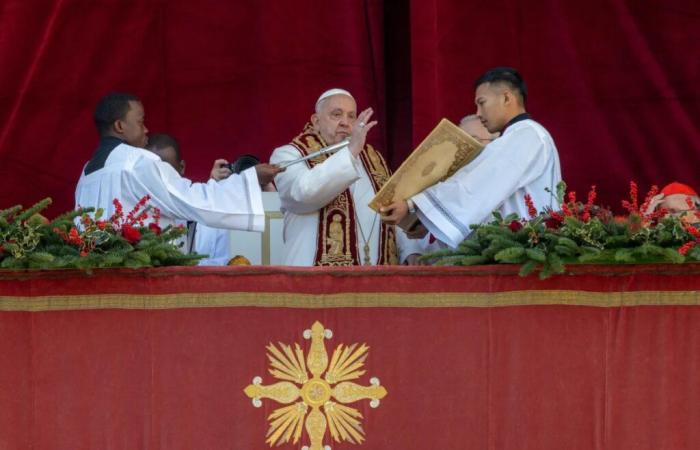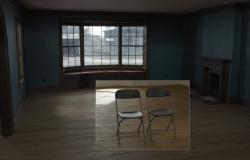Pope Francis exhorts: “Brothers and sisters, the door of God's heart is always open, let us return to Him! Let us return to the heart that loves us and forgives us! Let us allow ourselves to be forgiven by Him, let us be reconciled with Him!”
The Door is therefore Jesus, he states Pope Francisand then – he adds – “let us allow ourselves to be reconciled with God, and then we will be reconciled with ourselves and we will be able to reconcile with each other, even with our enemies”, because often “we only stop on the threshold” without having the courage to go beyond the Door as it “puts us into question”, and “requires the sacrifice of taking a step, of leaving disputes and divisions behind”.
Pope Francis then invites “every person, every people and nation to have the courage to cross the Doorto become pilgrims of hope, to silence the weapons and overcome divisions!”
The first thought is for the “tormented Ukraine”. “Have audacity – he states Pope Francis – to open the door to negotiation and gestures of dialogue and meeting, to arrive at a just and lasting peace”.
And the invitation is also for a ceasefire in the Middle East, with a thought “to the Christian communities in Israel and Palestine, particularly in Gazawhere the humanitarian situation is very serious.”
“Let the fire cease, the hostages be freed and the population exhausted by hunger and war be helped,” he underlines Pope Francis. Who then also expresses closeness to the Christian community “in Lebanon, especially in the South” (where there is the conflict between Israel and Hezbollah), but also “in Syria, in such a delicate moment”, and in general “throughout the region, torn by conflict”.
Pope Francis also remembers the people of Libya, and encourages them “to seek solutions that allow national reconciliation”, and also gives voice to the population of the Democratic Republic of Congo who is “dying from a measles epidemic”, an issue that, in the end, did not receive much international attention.
Remaining in Africa, the Pope looks at the situation in the east of the Democratic Republic of Congo (the North Kivu conflict), and then to Burkina Faso (for years a victim of jihadist waves), Mali, Niger and Mozambique also mentioned by the Pope in the last Angelus, and the Horn of Africa. These are all situations affected by humanitarian crises which – remember Pope Francis – are caused “mainly by armed conflicts and the scourge of terrorism and is aggravated by the devastating effects of climate change, which cause the loss of human life and the displacement of millions of people”. And the Papa he also calls for humanitarian access to Sudan, another forgotten territory, to be promoted and for “new negotiations to be started in the country with a view to a ceasefire”.
The quote is inevitable of Myanmar which, after the visit of Pope Francis in 2017, has once again fallen into continuous armed conflicts.
Then there is the situation in America, North and South. Pope Francis does not make precise references, and simply mentions by name the situations in Haiti, Venezuela, Colombia and Nicaraguaasking that “we work, especially in this Jubilee Year, to build the common good – and rediscover the dignity of every person, overcoming political divisions”. Just mentioning it, however, is drawing attention to borderline situations. In Nicaragua, even recently, bishops and priests have been expelled, in Venezuela there is a complex situationHaiti has been in crisis for some time, Colombia is still committed to peace paths.
Exhort Pope Francis: “May the Jubilee be an opportunity to break down all walls of separation: the ideological ones, which often mark political life, and the physical ones”. And it is at this point that Pope Francis looks at the “division that has affected the island of Cyprus for the past fifty years and has torn apart its human and social fabric”hoping “that we can reach a shared solution, which will put an end to the division in full respect of the rights and dignity of all Cypriot communities”.
Pope Francis remembers that Jesus “it is the wide open door that we are invited to cross to rediscover the meaning of our existence and the sacredness of every life (every life is sacred) and to recover the founding values of the human family”.
Sign up for our daily newsletter
Receive news on the Church in the world every day via email.
As part of this free service, you may occasionally receive offers from us from EWTN News and EWTN. We will not market or rent your information to third parties and you can unsubscribe at any time.
And it's Jesus himself, remember Pope Franciswhich awaits everyone on the threshold, starting from the most fragile – children, especially those who suffer from war and hunger, the elderly, refugees and refugees, the unemployed, prisoners who “always remain children of God” and also those persecuted for their faith, “and there are many”.
Pope Francis he also invites us not to miss “our gratitude towards those who do their utmost for good in a silent and faithful way: I think of parents, educators and teachers, who have the great responsibility of training future generations; I am thinking of health workers, law enforcement officers, those involved in charitable works, especially to the missionaries scattered around the world, who bring light and comfort to many people in difficulty”.
Finally, the Pope, also following the theme of Message for this year's World Day of Peaceasks that the Jubilee be “an opportunity to forgive debts, especially those that burden the poorest countries”, and recalls that “everyone is called to forgive the offenses received, because the Son of God, who was born in the cold and dark of the night, forgive all our debts”.






